新概念第二册第23课
- 格式:pptx
- 大小:10.55 MB
- 文档页数:26
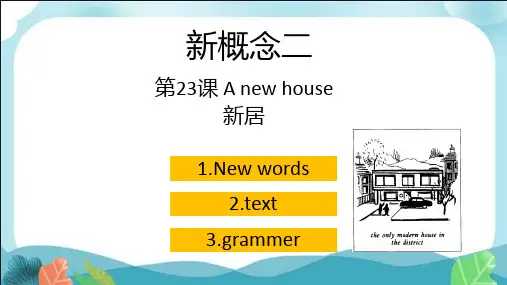
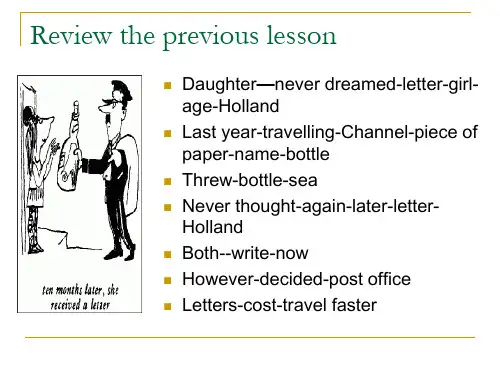



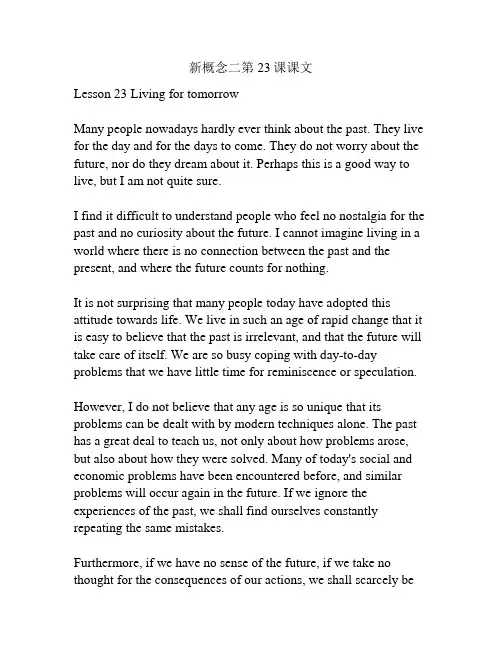
新概念二第23课课文Lesson 23 Living for tomorrowMany people nowadays hardly ever think about the past. They live for the day and for the days to come. They do not worry about the future, nor do they dream about it. Perhaps this is a good way to live, but I am not quite sure.I find it difficult to understand people who feel no nostalgia for the past and no curiosity about the future. I cannot imagine living in a world where there is no connection between the past and the present, and where the future counts for nothing.It is not surprising that many people today have adopted this attitude towards life. We live in such an age of rapid change that it is easy to believe that the past is irrelevant, and that the future will take care of itself. We are so busy coping with day-to-day problems that we have little time for reminiscence or speculation.However, I do not believe that any age is so unique that its problems can be dealt with by modern techniques alone. The past has a great deal to teach us, not only about how problems arose, but also about how they were solved. Many of today's social and economic problems have been encountered before, and similar problems will occur again in the future. If we ignore the experiences of the past, we shall find ourselves constantly repeating the same mistakes.Furthermore, if we have no sense of the future, if we take no thought for the consequences of our actions, we shall scarcely behuman. The ability to plan for tomorrow, to make provision for the future, is one of the basic characteristics of human beings. If we lose this ability, we shall lose our humanity.There is nothing wrong in living for today, provided we do not forget tomorrow. The past and the future are important, but the present is even more important. Indeed, we shall find it hard to cope with today's problems unless we take account of yesterday's mistakes and tomorrow's aspirations. We should never forget that yesterday's dreams are tomorrow's realities.。
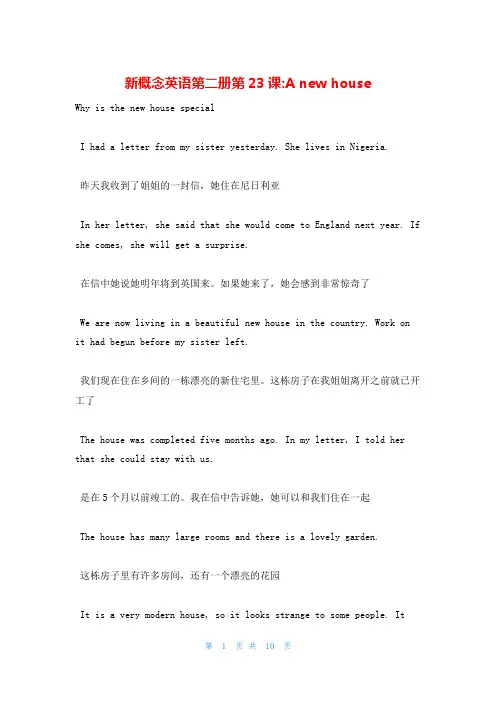
新概念英语第二册第23课:A new houseWhy is the new house specialI had a letter from my sister yesterday. She lives in Nigeria.昨天我收到了姐姐的一封信,她住在尼日利亚In her letter, she said that she would come to England next year. If she comes, she will get a surprise.在信中她说她明年将到英国来。
如果她来了,她会感到非常惊奇了We are now living in a beautiful new house in the country. Work on it had begun before my sister left.我们现在住在乡间的一栋漂亮的新住宅里。
这栋房子在我姐姐离开之前就已开工了The house was completed five months ago. In my letter, I told her that she could stay with us.是在5个月以前竣工的。
我在信中告诉她,她可以和我们住在一起The house has many large rooms and there is a lovely garden.这栋房子里有许多房间,还有一个漂亮的花园It is a very modern house, so it looks strange to some people. Itmust be the only modern house in the district.它是一栋非常现代化的住宅,因此在有些人看来很乖僻。
它肯定是这个地区唯一的一栋现代化住宅。
New words and Expressions生词和短语completev. 完成modernadj. 新式的,与以往不同的strangeadj. 奇怪的districtn. 地区Notes on the text课文注释1 get a surprisc中的,surprise这里作“使人惊奇、意外的事物〞解,是可数名词。

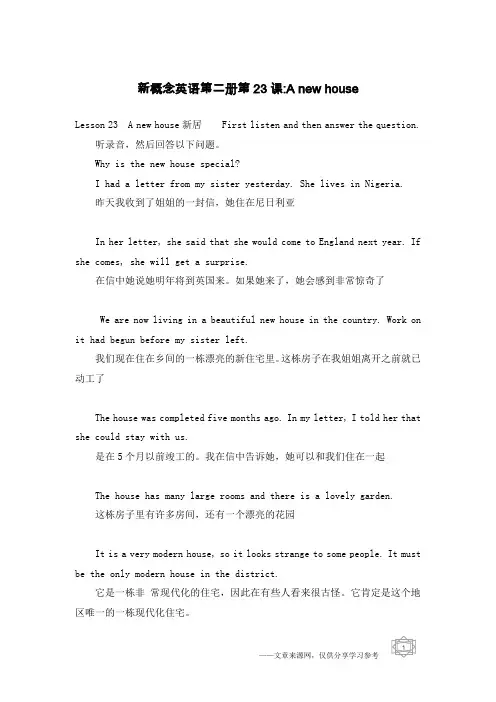
新概念英语第二册第23课:A new houseLesson 23 A new house新居First listen and then answer the question.听录音,然后回答以下问题。
Why is the new house special?I had a letter from my sister yesterday. She lives in Nigeria.昨天我收到了姐姐的一封信,她住在尼日利亚In her letter, she said that she would come to England next year. If she comes, she will get a surprise.在信中她说她明年将到英国来。
如果她来了,她会感到非常惊奇了We are now living in a beautiful new house in the country. Work on it had begun before my sister left.我们现在住在乡间的一栋漂亮的新住宅里。
这栋房子在我姐姐离开之前就已动工了The house was completed five months ago. In my letter, I told her that she could stay with us.是在5个月以前竣工的。
我在信中告诉她,她可以和我们住在一起The house has many large rooms and there is a lovely garden.这栋房子里有许多房间,还有一个漂亮的花园It is a very modern house, so it looks strange to some people. It must be the only modern house in the district.它是一栋非常现代化的住宅,因此在有些人看来很古怪。
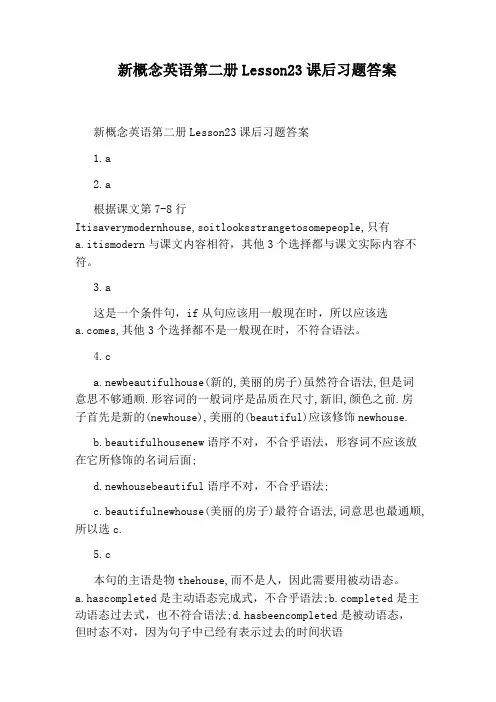
新概念英语第二册Lesson23课后习题答案新概念英语第二册Lesson23课后习题答案1.a2.a根据课文第7-8行Itisaverymodernhouse,soitlooksstrangetosomepeople,只有a.itismodern与课文内容相符,其他3个选择都与课文实际内容不符。
3.a这是一个条件句,if从句应该用一般现在时,所以应该选es,其他3个选择都不是一般现在时,不符合语法。
4.ca.newbeautifulhouse(新的,美丽的房子)虽然符合语法,但是词意思不够通顺.形容词的一般词序是品质在尺寸,新旧,颜色之前.房子首先是新的(newhouse),美丽的(beautiful)应该修饰newhouse.b.beautifulhousenew语序不对,不合乎语法,形容词不应该放在它所修饰的名词后面;d.newhousebeautiful语序不对,不合乎语法;c.beautifulnewhouse(美丽的房子)最符合语法,词意思也最通顺,所以选c.5.c本句的主语是物thehouse,而不是人,因此需要用被动语态。
a.hascompleted是主动语态完成式,不合乎语法;pleted是主动语态过去式,也不符合语法;d.hasbeencompleted是被动语态,但时态不对,因为句子中已经有表示过去的时间状语fivemonthsago,所以不应该用现在完成时,而应该是一般过去时;c.wascompleted是被动语态过去式,最符合语法。
6.a只有a.saidtoher同前面句子中的toldher意思相同,符合语法,是正确答案。
b.saidher不符合语法,her做间接宾语的时候前面应该有介词to;c.toldtoher不符合语法,因为tell是及物动词;d.told不符合语法,缺少宾语。
7.da.Theyhave因为前面句子中的主语是单数Thehouse因此应该用Ithas;b.Theyare(他们是)不合乎题目意思;只有d.Thereare表示“有”,“存在”最符合题目意思。

Lesson 23 A new house一、原文I had a letter from my sister yesterday. She lives in Nigeria. In her letter, she said that she would come to England next year. If she comes, she will get a surprise. We are now living in a beautiful new house in the country. Work on it had begun before my sister left. The house was completed five months ago. In my letter, I told her that she could stay with us. The house has many large rooms and there is a lovely garden. It is a very modern house, so it looks strange to some people. It must be the only modern house in the district.二、参考译文昨天我收到了姐姐的一封信,她住在尼日利亚。
在信中她说她明年将到英国来。
如果她来了,她会感到非常惊奇了。
我们现在住在乡间的一栋漂亮的新住宅里。
这栋房子在我姐姐离开之前就已动工了,是在5个月以前竣工的。
我在信中告诉她,她可以和我们住在一起。
这栋房子里有许多房间,还有一个漂亮的花园。
它是一栋非常现代化的住宅,因此在有些人看来很古怪。
它肯定是这个地区唯一的一栋现代化住宅。
三、精读笔记Part 1 词汇、短语1、there is/are 表示有....例句:There is a new school in our neighbourhood .在我们社区有一所新学校。
单词学习complete adj./n.adj. (很少有比较级、最高级的变化)1) 全部的,完备的the complete works of Hemingway 海明威全集a large house complete with swimming pool 一所设备齐全带有游泳池的大房子2) 彻底的,完全的a complete victory 完胜a complete failure 彻底的失败be complete完成/ be finishedeg. My work will be complete next week. 我的工作将于下周完成。
vt. 完成,做完,完结eg. The bridge isn’t completed yet. 这座桥还没有竣工。
completely adv. 完全地,全部地eg. I was completely at a loss what to do. 我完全不知道怎么办才好。
at a loss: not knowing what to do or say不知如何是好; 茫然; 困惑强调的副词:quite 十分absolutely / completely 完全地much 非常rather 相当地considerably 颇slightly 稍微a bit, a little 有一点儿modern adj.1) 现代的,近代的modern times 现代a modern discovery 最近的发现2) 现代的,时髦的eg. I’m afraid your ideas are not modern. 恐怕你的主意已经过时了。
modern school (英国不升大学的)中等学校modernization n. 现代化modern (a.) → modernize (v.) 使…现代化→ modernization (n.) 现代化the four modernizations 四个现代化类似的变化:real → realize → realizationglobe → global → globalize → globalizationstrange adj. 奇怪的,陌生的,生疏的,外行的,不习惯的eg. I am quite strange here. 我对这里相当不熟悉。
新概念英语第二册:第23课课文详解及语法解析课文详注 Further notes on the text1.I had a letter from my sister yesterday. 昨天我收到了姐姐的一封信。
have在这里相当于 receive。
(cf. 第18课语法)2.She lives in Nigeria… We are now living in a beautiful new house in thecountry. 她住在尼日利亚……我们现在住在乡间的一栋漂亮的新住宅里。
(1)live指长期居住,一般不用进行时。
第二个例句中的进行时是为了强调目前的居住情况。
(2)country指“乡下”(与town相对)时,一般与the连用,而不与my等所有格形容词连用,指“祖国”时则可以:I enjoy living in the country.我喜欢住在乡下。
My country is China.我的祖国是中国。
3.If she comes, she will get a surprise.如果她来了,她会感到非常惊奇的。
surprise 在这里是可数名词,指“令人惊奇的事”、“意想不到的事”:It's a surprise to me that they can't sell their flat.他们无法卖掉他们的公寓,这对我来说是件意想不到的事。
surprise 也可以作不可数名词,表示“惊讶”:She looked at the man in surprise.她惊讶地看着那人。
4.Work on it had begun before my sister left. 这栋房子在我姐姐离开之前就已动工了。
work(工作,作业)在这里是抽象的不可数名词,因此它前面不需要加冠词。
我们还可以说:Life is short.生命是短暂的。
(life也是抽象的不可数名词)5.…I told her that she could stay with us.……告诉她说,她可以和我们住在一起。